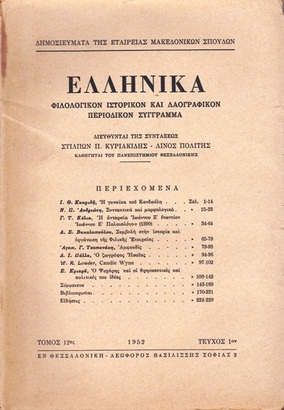Δύο όψεις του λόγου στην ποίηση του Παλαμά
Part of : Ελληνικά : φιλολογικό, ιστορικό και λαογραφικό περιοδικό σύγγραμμα ; Vol.47, No.1, 1997, pages 95-111
Issue:
Pages:
95-111
Parallel Title:
Two Faces of Logos in the Poetry of Palamas
Author:
Abstract:
One of the recurrent themes in the poetry of Palamas concerns the function of poetry, or Logos, itself. In order to examine this issue, this paper divides Palamas' poetic works into two broad categories: the first contains those works where Logos is frequently and positively mentioned, while the second those in which references to Logos are scarce or negative.' In the first category, Logos is associated with the idea of creation, the idea of homeland and the idea of redemption. The issues raised in the poems and collections of the second category concern the limits of creation, the ephemeral character of poetry and its inability to express phenomena and feelings. The turning point in Palamas' poetics can be placed in 1925: the first collection he publishes after the Asia Minor disaster as well as subsequent collections belong in the second category. However, this skeptical or even negative attitude towards poetry has already appeared in some of Palamas' pre-Asia Minor disaster works, and this historical event perhaps serves only to foreground and emphasize it. In his sceptical attitude, Palamas frequently encounters younger poets such as Filyras, Lapathiotis,' or even Karyotakis; nevertheless, unlike them, he never goes so far as to negate the value of poetry. Logos, whether praised or doubted, finally asserts its predominant role in the world
Subject:
Subject (LC):
Notes:
Μια πρώτη μορφή αυτής της εργασίας παρουσιάστηκε στο Συμπόσιο Κωστή Παλαμά (Αθήνα, Νοέμβριος 1993).




